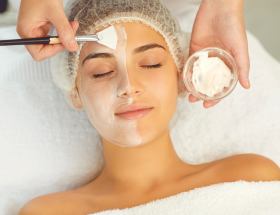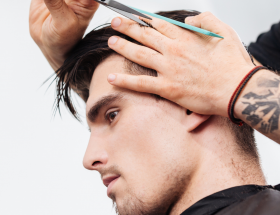Taking care of our skin is incredibly important, we put our skin through a lot as the years go by, and with it being classed as the largest organ, we should really take time to make sure that we are caring for it properly.
Whether you have sensitive skin, acne-prone skin, oily skin, combination skin, or dry skin, you should be creating a skincare routine that works with what you have.
Today, we will go through the process of how to create a daily skincare routine that works for you and your skin type, and if you want to know what exact products you should be using for your skin type, then we will provide you with a quick cheat sheet below, but you will still need to research different ones to see which will be best to incorporate into your skin care regimen.

Skin Type and Ingredients
For healthy skin, you will want to find out what type of active ingredients you will need to make sure that you are putting the right ingredients on your face for maximum impact.
Oily Skin
When it comes to oily skin, you will need to look for products that contain Alpha Hydroxy Acids such as Salicylic Acid and Glycolic Acid, as well as Benzoyl Peroxide, and Hyaluronic Acid.
This will help with controlling excess oil and sebum production whilst providing hydration to the skin.
When you use these ingredients, always remember to put on sun protection afterward, as they can make your skin a lot more sensitive to the UVA and UVB rays which can cause skin cancer.

Dry Skin
Dry skin products that contain Lactic Acid and Shea Butter will help with mild exfoliation as well as hydration.
This will keep the skin radiant without drying it out.
From darker skin tones to lighter skin tones, there will be a range of products that can help with managing dry skin, and like with oily skin, it is important to wear sun protection such as chemical sunscreens when going outside to prevent burning, but wait for about 20 minutes before going out when wearing chemical sunscreens so it can be effective.

Sensitive Skin
Once again, shea butter will be good for people who have dry/sensitive skin, as well as aloe vera gel and oatmeal.
They won’t dry out the skin and will hopefully prevent breakouts as they do not have a lot of chemicals in them.
Choose a light eye cream that won’t clog up your under eyes and cause Milia to form.

Always Read The Labels
These are just a few of the skin types that people have, so always remember – before you go and buy a product that you hope will help you exfoliate dead skin cells or help you banish dark circles, you need to find out what skin type you have first and read the ingredients to ensure that you are not wasting your money on products that don’t work.
Don’t just follow the hype with products you see online.
There may be a new vitamin C serum that looks great, but you may be paying more for the brand than you are for the actual product, so don’t let it draw you in.
You might find that some of the same ingredients are in more reasonably priced bottles.

Natural is Not Always The Best
You may have heard that some people use food products and liquids as skin care products (see apple cider vinegar), however, whilst this may sound like a good idea, it is not really for everyone and you might run into some issues.
Some skincare experts will say it’s fine as long as you do it correctly, whilst others are staunchly against it.
It would be beneficial to you and your skin care journey to read up about kinds of products like organic skin care and Holistic Energizing Skin Care, along with other tips so you are not just blindly going for it.
Sometimes it is best to just pay for eye creams than rub a banana peel under your eye.

How to Build a Daily Skin Care Routine at Home
Now that you are familiar with the various skin types, let’s delve into the essential components to incorporate into your comprehensive skincare routine. This breakdown will simplify the process and guide your actions effectively.
It’s recommended to follow your skincare regimen both in the morning and at night. This might involve substituting certain products used in the morning with alternative moisturizers and serums that are better suited for overnight use.
The core purpose of a skincare routine is to promote optimal skin health. While addressing concerns like skin aging and wrinkles is important, the primary focus should remain on nurturing healthy and vibrant skin. This proactive approach aims to prevent potential issues in the future.
In case the current routine you’re following isn’t yielding the desired results, it’s possible that there might be an issue with your approach. If this situation resonates with you, it might be a good idea to seek guidance from a dermatologist. You could also contemplate the prospect of exploring treatment alternatives, such as those available at Venus Rising Med Spa or similar establishments.
Remember, a well-rounded skincare routine goes beyond surface-level concerns and strives to create a foundation of enduring skin well-being.

Wash Your Face With a Cleanser
There is no better feeling than freshly cleansed skin, it feels alive again and washes away the night before first thing in the morning, and the grunge and make-up after a long day at night.
It will help tighten pores and get rid of any pollutants you have picked up from being outside.
Cleansers come in all different types depending on what your skin needs, so look out for what suits your skin type.
- Oily/Acne-Prone Skin – Foaming liquid
- Dry Skin – Cream or Lotion
- Sensitive Skin – Oil
- Mature Skin – Melting Balm
- All Skin Types – Micellar Water
There is a range out there so pick one that suits your skin type and won’t dry or break you out.
There will be some trial and error with this to ensure that you pick the right one for you.

Apply Toner
After you have cleansed your face, it would be best to apply a toner.
You can put a few drops onto your washed hands, or you may want to use a cotton pad if you want to be very hygienic.
If the toner you are using is exfoliating, such as Glycolic Acid, then you should only use this at night as it makes your skin sensitive.
Hydrating toners can be used twice a day and are used in many skincare routines.
Don’t mix retinoids and an exfoliating toner at the same time as this may cause a reaction on your skin which is bad for people to have a sensitivity and need to be gentle.

Apply Your Serum/Serums
To brighten up your face, you may want to use a vitamin C serum first thing in the morning as it will protect your skin from free radicals.
When it gets to nighttime, it would be best to use serums that promote hydration so that your skin does not dry out during the night.
Water-based serums will go underneath your moisturiser, whereas oil-based serums will go on top of your moisturiser.
People can get mixed up with this and always assume that serums will need to go under their moisturiser, this is a good way to waste a product and money as you are not using it correctly, so read the label and see why type it is before using.

Time For an Eye Cream
Occasionally, using your moisturizer as an eye cream is fine, but if it’s too thick, there’s a higher likelihood of experiencing tightening skin under the eyes. To avoid this, consider opting for an eye contour cream specifically designed for your skin type with a thinner consistency.
Application can be done using your fingers, or you can use a metal eye roller for a more hygienic application. Storing it in the fridge overnight can add a refreshing touch to your morning routine, helping to de-puff your eyes.
Use Spot Treatments
You might need to add on spot treatments if required, but they are normally applied just at night so they can work as you sleep uninterrupted.
Some of these will cause irritation, so be careful with layering them and get advice from a dermatologist as to how you need to layer them and how much you will need to use.

Don’t Forget to Moisturise
This is a very important step in your routine and not one you should be missing out on.
It locks in all your other products and it hydrates your skin so it doesn’t look worn out or dry.
Try a lightweight moisturiser in the morning, and go for a heavier one at night.
Apply Your Sun Protection
After your skin care routine in the morning, you will need to put on some sun cream as none of your products will be effective if you open your skin up to the elements without protection.
Sun cream will prevent skin cancer as well as skin aging, so it is important to not forget it before leaving the house, and remember to keep applying it throughout the day, especially if you are going to be outside a lot or you come into contact with water.
Ensure that it has high UVA and UVB protection stars on the bottle and that it suits your skin type.
The wrong type of sun cream will ball up on your skin and cause your cream to not mix well with your products, producing white balls that are sticky.
Trial and error will once again help you here.

Conclusion
You should now be more aware of what a daily skin care routine consists of and how you can use it to keep your skin healthy and looking good.
If you are still a bit wary, talk to the experts, they will be able to help you out and put you on the right path.









